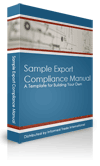ITAR Self-Enforcement: How Much Do We Tell the Government?
An important issue facing defense contractors today is exactly how much information should be shared with the Government about internal deficiencies with an import/export compliance program. Empowered Officials (EOs) and corporate executives are often uneasy about opening doors through which enforcement agencies may pass and ultimately cause irreparable harm to the company, its reputation, and its financial viability.
It is important to understand that a designated EO has a legal duty to ensure compliance with the ITAR and to report violations made known to him/her. The EO is often in the very uncomfortable position of having to take action that may potentially subject the employer to adverse action. It therefore becomes a matter of style, art, negotiation, and persuasion for the EO to find a formula for success that is legally compliant and ensures a higher likelihood of getting violations recognized and dismissed without penalty.
No formula for success is more important that ensuring that the company has an ITAR compliance program, minimally consisting of a compliance manual, training, recordkeeping, and properly trained employees responsible for activities under the ITAR. The EO should make every effort to interact with DDTC on all ITAR matters in order to establish well-defined business relationships and recognition of the company’s “presence” among those companies who make the extra effort to stay cutting edge in ITAR practices.
DDTC fully recognizes that the written letter of the law under the ITAR is often extremely ambiguous and subject to multiple interpretations. Consistent responses and actions from DDTC licensing officers are virtually impossible given the very nature of individual interpretation. Guidance is often difficult and usually non-binding. The level of frustration experienced by the company and the EO are often readily shared by those within DDTC.
The best course of action is to simply ask as many questions as you can. The DDTC Response Team is available by email and telephone and will readily and openly discuss your concerns and help resolve your problems. If they are unable to recommend a course of action, the EO may submit a written Request for Advisory Opinion which will result in a written position letter from DDTC, which although still non-binding, more than demonstrates a good faith attempt to decide on a proper course of action should a violation still occur. When mistakes are made, and they likely will be made, submitting a voluntary disclosure and working closely with DDTC in its final resolution provides the best means of ensuring fair consideration for future possible violations by demonstrating a willingness to remain transparent as to the company’s daily operations.
Upon identifying such activities, it is imperative to timely report these as voluntary disclosures and to work closely with the DDTC staff to ensure their closure without consequences. These reports require careful narrative in order to be sufficiently persuasive. Discuss at length each report with the enforcement officer assigned to the particular case to ensure that they have all the information required as well as to quell any concerns they might have about your ability to control the situation. Doing so will help establish a well-founded corporate reputation as a company that fully understands their duties under the ITAR.
The level, quantity and frequency of voluntary disclosures are not ongoing conditions for a company that takes steps to move in the right direction. There will always be an initial flurry of activity while a company goes through its growth spurts in becoming a higher level ITAR player. The expectation and typically the result is that these quickly diminish as the company improves its practices and becomes much more self-aware of its obligations and how best to handle them.
Mark Boileau, ITAR Empowered Official, Avon Protection Systems
Posted on February 1st, 2011 by admin
Filed under: ITAR

